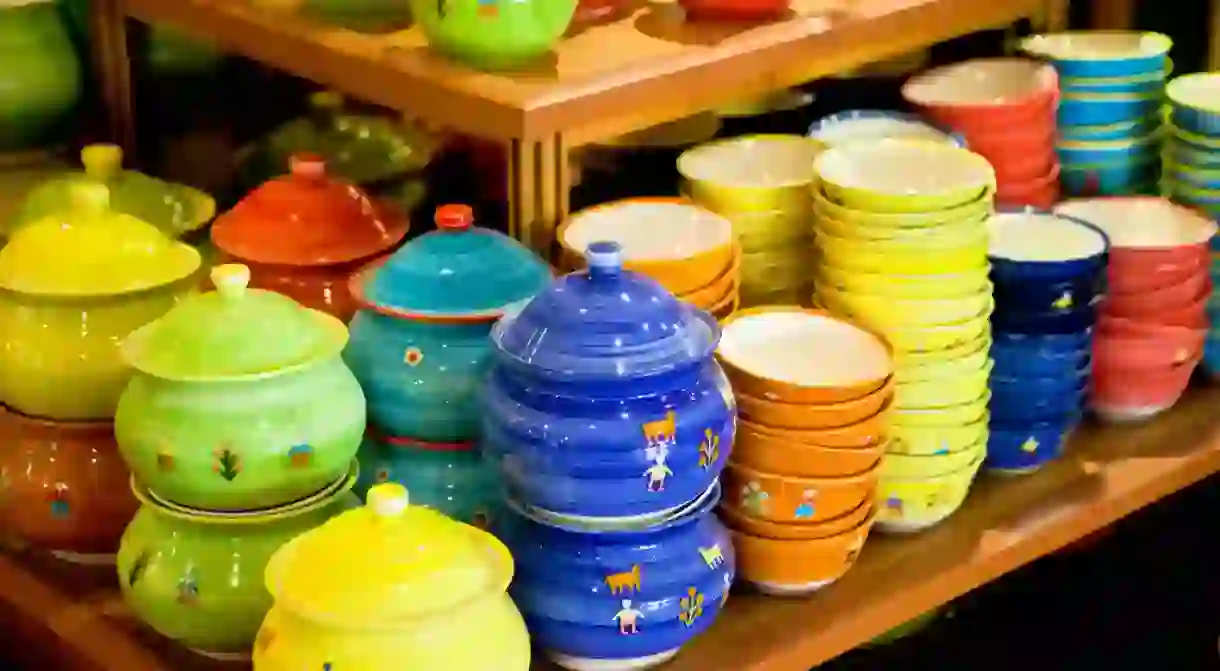8 Inspiring Decor Ideas from Iran

Iran has a long history of art and handicrafts, and Iranians are fans of decorating their homes with these items. Some of these age-old crafts have taken on modern twists, while some are mixed with contemporary pieces to create a unique blend of new and old. Check out some of these inspiring decor ideas from Iran with our guide.
Use Copper Dishes
Copper is plentiful in Iran, and bazaars in Yazd and Kerman in particular are known for their copper sections. Metal workers there can be seen busily banging away at sheets or polishing them. In Iran, this affordable metal can be used for cooking, serving, or just decoration. Feel like a masterchef and spruce up your kitchen with some brightly burnished copper pots.

Throw in Some Baskets
Baskets make for great storage or decoration, and in Iran this handwoven craft is a specialty of Khuzestan Province in the south. After weaving together thin strands of palm tree leaves, the item is left neutral or given a pop of color and design with bright threads sewn in. Commonly woven for use as small storage containers, vases, coasters, large discs, or anything else the artisan can think of, they are quite durable and add a perfect touch of nature to a home.

Choose Handmade Cloth
Many types of handmade cloth can be found around the country. Kerman is known for pateh, a hand-stitched decorative cloth that’s naturally dyed and made from wool. Esfahan has ghalamkari, a textile printed with wooden stamps, and Yazd creates termeh, a luxurious silk cloth that often includes fine threads of gold. Various sizes and shapes make these traditional cloths quite versatile for use around the house either as wall decorations, tablecloths, or runners.

Ceramics and Pottery
Pottery has played a role in Iranian history since before the Persian Empire. In the old days, small and large clay jugs were used to keep water cool. These days, cities like Lalejin, Yazd, and Natanz continue this age-old tradition and are well-known for their ceramics. While some are just for decoration, it’s common to use clay dishes in the kitchen, especially for cool beverages or side dishes.
Support your Back with a Poshti
Sitting on the floor was once customary in Iran, and poshti were placed against walls. With traditional red borders and patterned centers, these cushions are quite sturdy and provide back support. Nowadays many homes do not have poshti, although they can still be found in traditional homes. They might be a perfect little addition if you’re creating a cozy nook in your home in which to read or relax.
Add Some Sweet-Smelling Flowers
Who needs sprays to freshen up the home when there are lovely smelling flowers? A few Iranian favorites are hyacinth (included as part of the traditional Nowruz table), tuberose (known as Maryam, or Mary, in Persian), and daffodils. In addition to their simple beauty, these flowers smell heavenly, with their fragrances intensifying at night.

Include a Book of Poetry
Iranians love their poets, and if you’ve ever been to Iran, this becomes apparent quickly after seeing the many mausoleums dedicated to them. Plus, Iranians seem to have an innate ability to recite a few couplets on demand. An Iranian home without at least a few copies of Hafez or Sa’adi is, quite frankly, not a home. Keep a collection of poems within reach and it just might become more than a coffee table book one day.
Tie it All Together with a Rug
You can’t talk about Iranian-inspired decor without talking about rugs. Silk rugs are more decorative and shouldn’t be walked on too much, while a wool or wool-silk blend offers more durability. You’ll have a lot to choose from. The Qashqai and Bakhtiari nomadic tribes also offer their own unique designs. Though rugs are worth the investment, if you can’t quite take the plunge yet, a kilim might be a better option.














